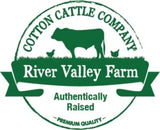Can Grassfed Cattle Eat Grass All Winter Long in New Jersey?
Ever wonder how grass fed operations remain 100% grass fed through winter months? There's storage hay of course but that can't really provide the same nutrition as holistic rotational grazing does during spring, summer and fall. The truth is, it takes some creative crop management and the method we're utilizing is still relatively "green" in the gassfed industry. See what we did there?
A few years ago, while on our constant quest to run our farm as holistically as possible and conveniently provide our customers with an outstanding product year round, we found a specialty corn developed just for the grass fed industry.
You see, corn is actually a grass. Right now you might be wondering, "then what's the big deal with grass fed cows following a strict no-corn diet?!"
The crop itself is not the issue necessarily but the grain, or seed, that the crop produces is what far too many big ag operations are mass producing, harvesting and over-feeding to their cattle. The high carbohydrate content within that grain, particularly in starch format, is what allows big ag operations to fatten cattle at an unnatural rate, so they can turnover product quicker. This has a horrible effect on the animal, the consumer, and our environment.
The corn crop that we're harvesting for our winter feedings has absolutely no grain on it. It is a non-GMO variety that is grown specifically for the grass fed industry. Once harvested, we mix the grass crop with our protein rich alfalfa-grass hay, and add a special inoculate of probiotics (think kimchi for cows), which boosts their immune and rumen health. The full package is a perfect balance of protein, probiotics, and carbohydrates, which is especially vital during the winter months. As we said, it involves some creativity and a lot of work (see below - we put up 400 tons in 4 hours and we have more photos and videos on our Facebook to prove it) but it keeps our cattle happier and healthier than if we just continued feeding them storage hay and natural supplements all winter long.





Thanks for the questions, Tish and Liana. As for the winter feed, the corn is sourced locally from a farm in Pennsylvania. When it comes to frozen versus un-frozen, we are strongly encouraged by the health inspector to stick with frozen. There are a few factors that play into this but one of them is that our harvest schedule doesn’t occur weekly and therefore doesn’t always align with immediate delivery following the harvest. Frankly, no body should be receiving “fresh” product from a farmer that was harvested a week before. Frozen is not only safer at this point but also helps to preserve nutrition and flavor. We hope to one day reach a point where weekly harvests are viable for us and you’ll be the first to know when that happens. Thanks so much for your questions and support.
Hi. You know me as the lady who buys your delicious bone broth containers every Saturday in Hoboken. Is it possible to have some fresh, not frozen stakes or other meat at the market? Liana
Neat. Are you guys growing this special corn or sourcing it locally?
Leave a comment